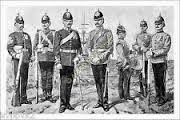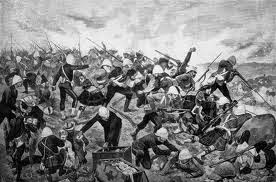Rita
An Army Life – Part One (The Early Years)
 On the 19th of November 1880, a certain William Colenutt enlisted in the Army having previously been a mason’s labourer. He was nineteen at the time of his enlistment having been born in 1861.
On the 19th of November 1880, a certain William Colenutt enlisted in the Army having previously been a mason’s labourer. He was nineteen at the time of his enlistment having been born in 1861.
These facts, although interesting, are unremarkable as large numbers of men from all walks of life enlisted in the Army and the Navy. Why was William different? Did he win a Victoria Cross in action or was he promoted to a high rank? The answer is no. When William left the army in 1887 he was released holding the same rank as he entered. that of a Private.
He had played a minute part in maintaining the Pax Britannica which roughly lasted between 1815 to the outbreak of the First World War. Britain was at the height of her powers and governed great swathes of the world. Due to our military might we had no real rivals with the exception of possibly Russia.
Because of this, a peace was maintained. Britain due to the strength of its Navy was an unchallenged sea power. Trade routes were left open and Britain controlled the economies of many countries.
But all this came at a price as there were many colonial wars to be fought and won to maintain the general peace. The British, in a way were acting as a global police force and it needed the enlistment of men such as William to keep the wheels of empire oiled.
Britain was well aware that what started as a local uprising could if unchecked escalate into a full scale war if treated lightly. If you fought from a position of strength then a certain peace could be maintained no matter how bloody.
It was like a giant game of chess. But why am I picking out William alone, why should he be the subject of this article?
The answer is that a short while ago I was handed a worn leather wallet which contained the discharge certificate and two army account books of a William Colenutt, who, as I have noted previously, served his country between 1880 and 1887.
With the exception of the Crimean War (1853-1856) and the Indian Mutiny (1857), Britain faced no large conflicts and although victorious in both, it was obvious that the army was not really moving with the times and with the global theatre growing larger each year, urgent reforms were needed.
The physical fitness of the soldiers was open to question as the country had no trained reserves. In certain ways we were unable to defend our own borders but more of that later.
If you took the rest of the world in a window of William’s service (1880-1887), the following wars or conflicts were taking place to name but a few.
The Basuto Gun War (1880-1881)
First Boer War (1880-1881)
The French Occupation of Tunisia (1881)
Mahdist War (1881-1889)
Mandingo Wars (1882-1898)
Ekumeku Movement (1883-1914)
First Madagascar Expedition (1883-1885)
Tonkin Campaign (1883-1886)
Sino-French War (1884-1885)
North-West Rebellion (1885)
Serbo-Bulgarian War (1885)
Third Anglo-Burmese War (1885 -1886)
As you can see even from this short list,. the world was far from a peaceful place. But let us look at the period (2007-2014). I wonder how this list would compare to someone a hundred and thirty years later.
We are all aware of the Syrian conflict and the troubles in Afghanistan and many others. Is the world a more peaceful place? Maybe yes, maybe no.
In a way, we have learned the lessons of history but, we have also forgotten them. It never ceases to amaze me how fast, even a country as liberal and democratic as our own, tends to enter conflict. The Falklands War in 1982 and the more recent involvement in Iraq spring to mind.
 However, this type of thinking would have been far from William’s thoughts when he joined up in 1880. As I have noted, William had been a mason’s labourer, which from a modern perspective, must have been arduous work and occasionally dangerous. The dust from the stone would not have done wonders for William's health or the health of his pals in the yard.
However, this type of thinking would have been far from William’s thoughts when he joined up in 1880. As I have noted, William had been a mason’s labourer, which from a modern perspective, must have been arduous work and occasionally dangerous. The dust from the stone would not have done wonders for William's health or the health of his pals in the yard.
Looking at the worn leather wallet and the contents, they give no clue to William’s aspirations or goals and any reasoning he might have had for joining up.
Maybe he was bored and wanted to see the world, maybe, (and this is fanciful) it was due to a sad love affair. He most probably saw little or no future in working with stone apart from possibly an early death from exhaustion or other related diseases.
You might think I am a little extreme in my association, but I had occasion to visit some of the quarries near Portland about thirty years ago and was shocked to see how manual some of the processes still were. The men seemed worn and aged before their time. Many of the men I met were heavy drinkers and smokers, but most all the thing that I remembered, was the resignation of these men.
I had visited the quarries as an art student walking in the footsteps of the sculptor Henri Gaudier Brzeska (I was really looking for his ghost as I knew he had visited the area before World War One) but all I found was a lifestyle that had not radically changed for many years. In a way it has haunted me ever since.
It is a supposition on my part to assume that William had worked or even had association with Portland. As a mason’s labourer he was most probably located in a small yard somewhere in Dorset, Hampshire or the Isle of Wight working with stone each day. This might or might not have been Portland Stone.
From my perspective, I think William was bored and did not see a future for himself. He craved excitement, Dorset and Hampshire in the 1880s was not all Thomas Hardy,Troy, Bathsheba and Tess. These were hard places to live although the geography was favourable.
Life would have been a challenge for the average man and poverty (especially if you had a family) was never far away. I think Hardy’s later Jude the Obscure best sums up what I am trying to illustrate.
 As I write this, to my left lie two booklets and a parchment relating to William’s army life. What do I know about him? Well as I have noted he was born in November 1861 and appeared to have entered this world near Sandown on the Isle of Wight. He was of average height (5ft 9ins) and of a fresh complexion. His eyes were a greyish brown and his hair was also brown. He had no disguising marks or scars and belonged to the Church of England.
As I write this, to my left lie two booklets and a parchment relating to William’s army life. What do I know about him? Well as I have noted he was born in November 1861 and appeared to have entered this world near Sandown on the Isle of Wight. He was of average height (5ft 9ins) and of a fresh complexion. His eyes were a greyish brown and his hair was also brown. He had no disguising marks or scars and belonged to the Church of England.
Well that was all the army wanted to know about him. He would have been subjected to the routine medical and would have been passed fit.
What I did find interesting from his army papers was that although he was first noted as being five feet nine inches tall, later he was noted as being five feet ten inches tall in December 1882, whilst in the period 1884-1886 he was noted as being five feet eleven inches tall.
His boot size also varied between sizes eight and nine.These differences might have been as William was still growing or just the muddled recording of facts.
It is likely that his diet might have been superior although according to his clothing account details, he had not filled out much during this period.
Another thing that I noticed from his account and monthly settlements booklets was that his signature had changed slightly. At the time of his entry his signature seemed timid and somewhat immature. The signature of somebody that was not totally at ease with their education or lack of it.
His signatures however, mature throughout these booklets. William it appears, has become more bold during his army service. When he worked as a mason’s labourer it is likely that he was still treated as a callow youth without much experience of life. After a couple years of army life, William is obviously much more confident and outgoing. He is a man amongst other men.
Another interesting clue to William’s background is to be found in his account booklet on page fourteen.This page deals with The Soldier’s Next-Of-Kin Now Living. What this does tell me is that in 1880 William did not have a mother. His father and three sisters (Clara Mary and Bertha) were still alive and all lived in the district of Sandown on the Isle of Wight. No mention of their occupations were noted though.
I wonder, now that William had a settled income, how much of that he sent home and what was the exact circumstance of his family?
It also reinforces that being in the army could be a very dangerous occupation. Whether a tropical disease got you or you died in some unimportant skirmish far from home, there was a good chance that you might not see your service out.
I remember a friend of my father’s telling me of the graveyards he found in Northern India just before the last war. They were full of memorials to people from the United Kingdom and other parts of the Empire who, with their families, had gone to India in military and civilian capacities and had died from disease shortly after.
The country was especially harsh on children and quite a large number of the graves he found were of young people under twenty.
Did William think of this (or if he was even aware) when he joined up? One has to remember the Empire was at its height and subjects such as disease might have been brushed over. Especially as one was more likely to die of disease than meet a violent death when in service.
On the 12th of July 1882 William was about to find out for himself as his duty in India was about to begin. Also cast your mind back to my listing of wars and conflicts which were taking place during William’s service. One in particular, the Third Anglo-Burmese War (1885-1886) was there waiting for him.
Why did his army service come to an end in 1887 and what do the small selection of his army papers tell me about his time in India and Burma?
More will be revealed in the second part of this article An Army Life – Part Two (William in India)
Stuart Miller-Osborne
For all the news, read the latest edition of our Newsletter at www.hungerfordarcade.co.uk



No comments:
Post a Comment